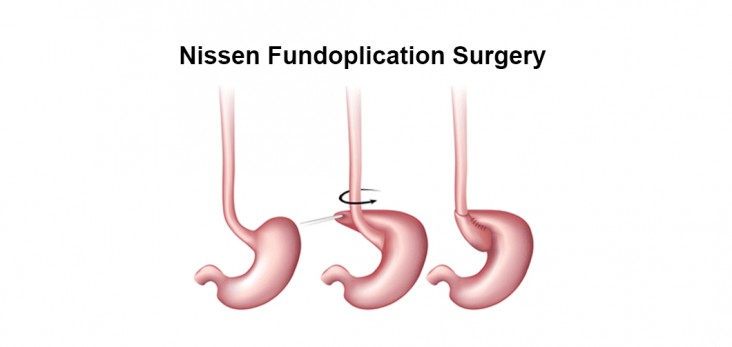Laparoscopic Nissen fundoplication is a surgical approach to treating gastroesophageal reflux disease (GERD). This surgery aims to strengthen the weakened area of the esophagus that causes stomach acid to flow up instead of down. Nissen fundoplication surgery is designed to fix the weak area of the esophagus. The surgery is performed laparoscopically.
Few complications after a fundoplication surgery are difficulty in swallowing, esophagus sliding out of the wrapped portion of the stomach, Bloating and discomfort from gas buildup, excess gas, risks of anesthesia, risks of major surgery (infection or bleeding).
If an open surgery is done, you have to spend several days in the hospital and you may need 4 to 6 weeks to get back to your normal routine. If the laparoscopic surgery method is used, you have to stay in the hospital for only 2 to 3 days and most people can go back to their normal routine in about 2 to 3 weeks.
After your surgery, you have to follow a special diet to help prevent diarrhea, gas, and problems swallowing. You can drink clear liquids for your first few meals. Then follow a full liquid diet and then a Nissen soft diet. Eat small, frequent meals (six to eight per day). This will help you consume the majority of the nutrients you need without causing your stomach to feel full or distended. Drinking large amounts of fluids with meals can stretch your stomach.
Eat very slowly. Take small bites and chew your food well which will help in swallowing and digestion. Avoid crusty breads and sticky, gummy foods, such as bananas, fresh doughy breads, rolls and doughnuts. Sit upright while eating and stay upright for 30 minutes after each meal. Do not lie down after eating. Sit upright for 2 hours after your last meal or snack of the day.
The first bowel movement may occur anywhere from one to five days after surgery. As long as you are not nauseated or having abdominal pain, this variation is acceptable. Remember that it is very common to pass a lot more gas from your rectum; this is because you will not be able to really belch.
There are no significant restrictions on activity after surgery. You can walk, climb stairs, mow the lawn or exercise, as long as it does not put a strain on you. Returning to normal activity as soon as possible will most likely enhance your recovery. Try to avoid heavy lifting for several weeks.
Important –
Contact your surgeon immediately, if a fever arises up to 100.4 or greater, shaking chills, pain that increases over time, redness, warmth, or pus draining from incision sites, persistent nausea or inability to take in liquids.







